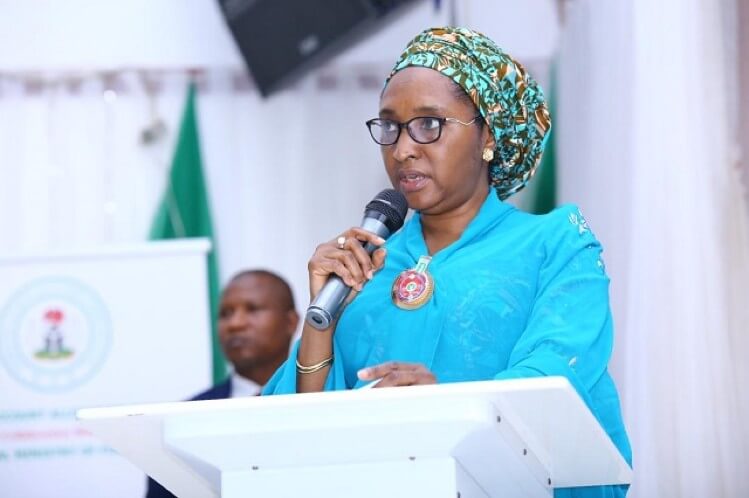llicit Financial Flows Threatening Nigeria’s Revenues- Finance Minister
The Minister of Finance, Budget and National Planning, Mrs Zainab Ahmed, on Tuesday said illicit financial flows, if left unchecked, could erode domestic revenue mobilisation efforts of the Federal Government.
The term Illicit Financial Flows refers to financial flows that are illicit either by virtue of their origin (e.g. stemming from organised crime), their utilisation (e.g. to finance terrorism) or the nature of the transfer itself (e.g. money laundering).
Advertisement
Interestingly, the effects of IFFs are particularly devastating for developing countries and increasingly undermine international efforts to promote sustainable development.
Undoubtedly, criminal activities associated with IFFs, such as human trafficking or the illegal trade in drugs, destabilise countries and regions and thus increase the risk of violent conflicts.
The think tank Global Financial Integrity estimates that developing countries and emerging economies lose more money through illicit financial outflows than they receive in foreign direct investment and official development aid combined.
IFFs therefore prevent countries from making urgently needed investments in health, education and other public services.
Advertisement
Not only do countries lose resources, but their success in preventing ‘dirty money’ from entering the financial system also determines their access to international finance.
At a virtual International Conference on Illicit Financial Flows (IFFs) & Asset Recovery held virtually, on Tuesday, Ahmed said the effects are being especially felt given the ongoing COVID-19 pandemic and the resultant deepening of fiscal constraints and public financing gaps.
She also declared that commercial activities are responsible for 65 per cent of the estimated $18bn annual illicit financial flow from Nigeria.
It is estimated that Nigeria loses between $15bn and $18bn to illicit financial flow annually.
It was also ranked 14th most vulnerable country out of 125 in the 2020 Basel Anti-Money Laundering Index in addition to emerging 146 of 180 on the 2020 Corruption Perception Index of Transparency International.
Advertisement
Addressing the meeting, the Minister warned that if not checked, illicit financial flows will continue to significantly erode domestic revenues, enable corruption, threaten economic stability and sustainable development, divert money from public priorities and hamper Government’s efforts to mobilise domestic resources and recover better.
She said, “Commercial activities like aggressive tax avoidance and tax evasion, through trade mispricing, abusive transfer pricing, profit shifting and tax arbitraging account for approximately 65 per cent of illicit financial flows across Africa.
“In Nigeria and across the African continent, we continue to suffer various forms of IFFs, including tax evasion and other harmful tax practices, the illegal export of foreign exchange, abusive transfer pricing, trade mispricing, mis-invoicing of services, illegal exploitation and under-invoicing of natural resources, organised crimes, and corruption.
“The resulting domestic revenue losses are significant, putting developing countries and the entire African region at risk of not achieving sustainable and inclusive development, especially in the wake of the coronavirus pandemic.
“Furthermore, we in Africa often find ourselves in a “race to the bottom” to attract foreign direct investments (FDIs), as a result of the current international tax practices and treaties.”
According to her, commercial tax evasion and other types of IFFs inevitably impact the allocation of already limited government funds, with a disproportionate impact on public services benefiting women and youth.
Advertisement
She said curbing IFFS can lead to improvements in environmental, social, and economic development in Africa.
“As one of the most affected countries, Nigeria has demonstrated a strong commitment to addressing illicit financial flows through our participation in the Open Government Partnership and the significant progress made in the extractive industry,” she added
She highlighted some of the steps taken to curb the scourge.
The Minister disclosed that eradication of the scourge requires sustained cooperation between Africa and multilateral organisations.
She said, “We encourage the international community to explore and develop specific and targeted measures, including mutual legal assistance, to address barriers to international cooperation on this important matter and Africa must have a seat at the table and be well represented during negotiations about illicit funds and their proceeds.”
The Minister said it is also critical that countries that are the main destination for illicit financial flows and their proceeds take urgent steps to assist in combating this scourge, preventing the inflow of illicit funds, freezing or seizing assets already in the country, and by ensuring that illicit funds and any proceeds are repatriated.
She explained that Nigeria has taken proactive steps towards the recovery of previously stolen assets, in part through engagement with multilateral stakeholders.



